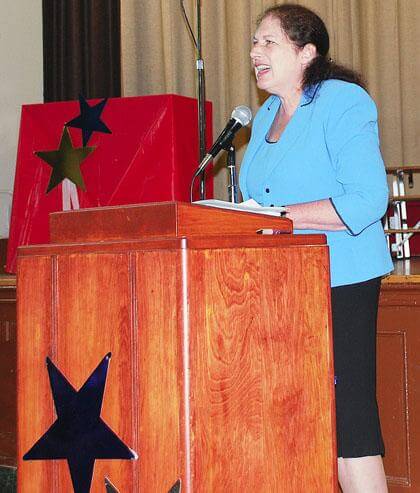By Anna Gustafson
City Council candidate Heidi Harrison Chain’s announcement last week that she will decline public matching funds has prompted others in the race for Councilwoman Melinda Katz’s (D-Forest Hills) seat to criticize the move, saying she is ditching a program meant to level the financial playing field and could now far outspend her opponents.
Chain, a Democrat, disagreed and said she rather wanted what would have been her matching funds to be funneled into community groups hurt by a rough economy, a statement with which some of those running against her also took issue.
“It’s unfortunate that Heidi Chain has decided not to participate in New York City’s Campaign Finance program,” said Democratic candidate Lynn Schulman. “It is worse still that she has decided to cloak her decision with the language of altruism. The [Campaign Finance Board] system is designed to make sure that elections are about issues and ideas, not just about who has more money.”
Chain, who qualified for the matching funds program, said she does not anticipate grossly outspending others in the race for the 29th Council District, which includes Forest Hills, Rego Park, Kew Gardens and parts of Richmond Hill, Maspeth and Elmhurst.
“I’m getting contributions from my supporters, and I’m going to be putting in some of my own funds,” Chain said. “The more contributions I get I really appreciate, but I cannot see it becoming a wild spending thing. That’s not what I’m about.”
Instead, Chain said she hopes the city will use the money for city residents, especially seniors, struggling in the economic downturn.
“There is such a financial crisis in the city now, there are so many programs that are being cut, and there’s so much that needs to be done that at this point in time I don’t see it as being the right thing to do,” Chain said of accepting matching funds.
The money not used by candidates would eventually go into the city’s general fund, but candidates may not specify how they can be spent. The Campaign Finance Board will match each dollar a city resident gives up to $175 with $6 in public funds, for a maximum of $1,050 in public funds per contributor.
Program participants must abide by strict spending limits, which is $161,000 for the Council primary in September. The total amount each candidate can receive in matching funds is capped at 55 percent of the spending limit.
Should Chain spend a great deal more than her opponents, the candidates may be able to qualify to receive public funds at an accelerated rate of up to two-thirds the amount of the spending limit.
Democratic candidate Karen Koslowitz said she also opted to be part of the program because she did not “have the money to not use matching funds” and reiterated Schulman’s statement that any funds returned to the general fund may not be allocated for specific purposes.
“The city’s programs are funded from the general fund,” Chain said. “So it could be used to fund extra police on the street or keep a firehouse open.”
Schulman has currently raised the most amount of money, and as of the latest filing May 15, she had raised $58,570. Chain had the second greatest amount, with $54,562. Koslowitz had $23,550; Michael Cohen had $31,300; and Mel Gagarin had $11,808.
Democratic consultant George Arzt said it is “very uncommon” for candidates to opt out of the matching funds program.
“It’s a serious issue because the campaign finance is supposed to level the playing field for everybody,” Arzt said. “In local races, where it’s so difficult to raise money on your own and you have people who have been in the system for a long time, you can easily use great amounts of money to make a tremendous impact in overwhelming opponents.”
Reach reporter Anna Gustafson by e-mail at agustafson@cnglocal.com or by phone at 718-229-0300, Ext. 174.



































